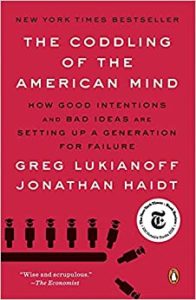A review of The Coddling of the American Mind: How Good Intentions and Bad Ideas are Setting up a Generation for Failure, by Greg Lukianoff and Jonathan Haidt (Penguin Books, 2019)
People who write about campus trends have noted phenomena such as the disinviting of speakers, the conflation of controversial ideas with violence, and student hectoring of professors. Other writers have noticed that children seem to have far less unstructured play time than they once did. Many parents of a certain age have noted the prevalence of peanut allergies in children, a condition barely even heard of when they – ok, we – were young. What ties all these things together? According to Greg Lukianoff and Jonathan Haidt, they’re all the result of the advent of a kind of “coddling” of the youth, ironically by an older generation raised in exactly the opposite way.

The use of the word “coddling” in the title is likely to make some people assume the book is some kind of “right-wing” diatribe against the perceived “snowflake” culture of the modern left. That assumption would be mistaken. For one thing, neither author identifies as right-wing. Also, the subtitle contains a clue: they think the people they’re disagreeing with have good intentions. It’s just that they are operationalizing those intentions in ways that Lukianoff and Haidt think are quite mistaken, the result being that today’s youth live in a state of enhanced fragility. So, is this one of those books that rails against the failings of the younger generation? After all, every generation seems to think that “kids these days” are deficient in something. But this book is also not one of those. The problem isn’t the kids. It’s the adults.
Lukianoff and Haidt catalogue three mistaken ideas that they think are largely responsible for the change. They are “mistaken ideas” in the sense that if they were applied in any other context, their wrongness would be apparent, which the authors illustrate in a wonderful allegory that opens the book about a bizarro “sage” who is wrong about everything. One is that children are extraordinarily fragile rather than adaptive and antifragile. This means that opportunities to learn and grow are curtailed rather than sought out. It leads to an expansion of the concepts of trauma and safety, which Lukianoff and Haidt argue is not grounded in legitimate psychological research. The myth of fragility also leads to what they call “safetyism,” a world view on which all threats must be eliminated and no trade-offs are ever needed.
The second mistaken idea they explore is emotional reasoning. According to cognitive behavioral therapy, emotional reasoning is one of the cognitive disorders that fosters or exacerbates depression and anxiety. Lukianoff and Haidt argue that despite the consensus of contemporary psychological therapists (and ancient philosophers!), the current generation of adults encourages children (up through college students, although these are in one sense not children) to engage in emotional reasoning, which results in, among other things, a tendency to interpret the actions of others in the least charitable way possible.
The third mistaken idea Lukianoff and Haidt identify is “us-versus-them” thinking, which amplifies our worst instincts towards tribalism and black-and-white oversimplifications. The prevalence of these three ideas, and their synergy, is what leads to phenomena such as “call-out culture” (both on campus and on social media), increased incidence of anxiety and depression in teens, bureaucratic intrusion in the name of safety, and paranoid parenting.
Think about the many levels of irony involved in modern parents who won’t let their children walk to the park alone to play with friends. One, these parents almost certainly spent their youth engaging in just the sort of unsupervised play they now deny their children. Two, they do this out of fear of violence or abduction, despite the fact that the rates of those crimes are way down over the last several decades. And three, these are the same parents who want their kids to learn the piano and soccer and coding by age ten, yet are cutting off real opportunity for learning and development through socialization. The book does mention LetGrow.org and the Free-Range Kids movement as possible pushback, and while some parents have faced legal trouble for letting their kids walk around the corner alone, some states are now starting to amend their laws.
Lukianoff and Haidt do an excellent job showing how the “three great untruths” play an enormous role in so many of the social and psychological problems faced by today’s teens and college students. Their argument is coherent and compelling, and also well-documented. The notes at the back reveal that a tremendous amount of research went into the book, differentiating it from ranty jeremiads. Their writing and organization are refreshingly clear. This book should be widely read by the older folks who have played a role in promulgating the great untruths, and also by the younger people who might really benefit the most from seeing what misconceptions they’ve been tormented by. One problem, of course, is that so many people now have a vested interest in the way things have become, from school administrators to safety bureaucrats to student leaders, that it’s hard to see how the trend could be reversed now. But it’s possible, and the effort requires a book such as this one.
Aeon J. Skoble is professor of philosophy at Bridgewater State University and a senior fellow at the Fraser Institute.


READER COMMENTS
Phil H
Jul 7 2021 at 1:05am
“So, is this one of those books that rails against the failings of the younger generation?”
Yes, obviously it is. Apparently young people suffer from “phenomena such as ‘call-out culture’…increased incidence of anxiety and depression in teens…social and psychological problems…”
Unlike the adults who overreacted so strongly to the election of a president of the wrong race that they put in power a reality TV star signally unfit for office.
It’s disappointing that the reviewer, even after explicitly considering the kind of book that this is, then immediately dismisses the suggestion that this is a “youth of today” book. It doesn’t matter whether you agree with it or not, you still need to recognize what it is.
Mark Z
Jul 7 2021 at 2:06am
And here you’re dismissing the book because it criticizes the youth of today. At least the reviewer actually delved into the substance of the book.
Phil H
Jul 7 2021 at 9:47am
I didn’t comment on the book. Your psychic powers are just as good as Yuri Geller’s.
Mark Z
Jul 7 2021 at 7:00pm
Then what does the “it” in your first sentence refer to?
Jon Murphy
Jul 7 2021 at 6:53am
You misunderstand Aeon’s point. “The youth of today” is an expression that means the criticizing generation had it perfect while the “youth of today” are the source of problem. What Aeon is saying is that the book doesn’t point blame at the youth. Their behavior is the symptom, not the cause.
Christophe Biocca
Jul 7 2021 at 3:08pm
The problem with that theory is that the set of voters in both elections (and in the 2012 election) was substantially the same. Even if you assume all McCain voters were die hard racists who became even worse once a black man got the presidency, there’s just not enough of them to get their way (otherwise Obama wouldn’t have won in the first place).
To the extent the electorate changed, it’s the usual old-people dying, young people reaching majority, immigrants getting citizenship, dynamic, which if anything should work in the opposite direction.
And we know a substantial percentage of Americans voted for Obama and for Trump (it’s not clear if they were enough to flip the vote on their own, but they definitely contributed). Were these people overreacting to the election of the guy they voted for in the first place (twice, for many of them)?
If you want to mock American voters (and I wouldn’t blame you), pick something that even remotely fits the facts, like being way too influenced by stupid slogans, or motivated by sexism (since at least the hypothetical sexism-as-top-issue voters wouldn’t be waiting 4+ years to suddenly decide they didn’t want a black man as president, resulting in flipping an election in which both candidates were white).
Michael
Jul 10 2021 at 9:03am
Your criticism doesn’t make sense. The book lays the majority of the blame at the feet of the adults who raised the children. It is not a “criticism” to acknowledge that some people are suffering from unfortunate circumstances and that there are wider consequences to that suffering. Would you call a book about homelessness a criticism of people without houses?
Aeon Skoble
Jul 11 2021 at 2:41pm
Did you read the book? It’s not primarily a criticism of the young people, but of the older generation that has created the conditions in which they find themselves. I don’t mean they have _NO_ criticisms of the excesses esp. of the college-aged, but my point was that the mindset and behavior of the young is the result of bad moves by the parent generation. The authors are certainly alarmed by (e.g.) student mobs shouting down speakers, but their point is merely “look at these awful kids,” it’s “what on earth happened that has resulted in the kids acting like this?” And they have answers.
KevinDC
Jul 7 2021 at 1:27pm
I’m guessing you never actually read the book, because this is, well, obviously false. Yes, the book does talk about “phenomena such as ‘call-out culture’…increased incidence of anxiety and depression in teens…social and psychological problems”, but it just doesn’t follow from this that therefore the book claims these issues result from “the failings of the younger generation.” It explicitly argues the exact opposite – the younger generation is dealing with these things as a result of the failings of the older generation! The authors of the book aim their criticism at their own generation, and defend the younger generation at every step in the process. As Aeon correctly says in his review, according to the authors, “The problem isn’t the kids. It’s the adults.”
Think of it this way. Every now and then, someone writes a book or think piece arguing that because of bad financial/economic policies of previous generations, the youth of today are struggling with all kinds of economic hardship. It would be very bizarre to respond to this by saying “The author says the youth are only sporadically employed, taking on massive debts, and not saving for the future, so obviously he’s just railing against the failings of the younger generation!” No, the author is defending the younger generation by saying they got screwed over by the older generation! And that is what Haidt and Lukianoff also argue.
Comments are closed.